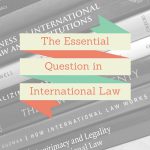My latest academic projects have propelled me into the strange relationship between the United States Constitution and international law. Some of my research – and that of some awesome research assistants – has painted an incomplete picture of how the US legal system handles international obligations. My picture is incomplete because I feel that American law has not determined its own relationship with international law. But the uneasiness between international law and the US also seems to stem from something cultural. So when I have finally completely sketched out this incomplete legal picture from my European point of view, I’ll take up that thesis. But for now, let me convey my first impression of the legal situation briefly. Very briefly. I apologize to my American lawyer colleagues in advance. If I screw up, please do let me know. In fact, I implore them to come to my aid.
First Impressions of the US Constitution
The last few years I have been doing research into the (non-)application of the Vienna Convention on Consular Relations in the United States that gave me an opportunity to get into US constitutional law. Article VI of the US Constitution states that ”all Treaties….shall be the supreme Law of the Land….”. That seems straightforward enough, but only so-called self-executing treaties are directly applicable and enforceable in the US legal system. Other treaties need implementing legislation by Congress. Throughout the years, more and more treaties are considered non-self-executing. In any case, in my research, I also encountered quite recent US Supreme Court (SCOTUS) cases in which the Court refused to give direct effect to judgements of the International Court of Justice (for instance, the Medellin-case) in American domestic law. So, the United States may continue to be held responsible on the international stage for violating binding ICJ orders, but a court in Texas is not bound by that order as a matter of American law. I would think that would leave the US federal government in a bit of a pickle. Now, implementing legislation is even needed for ICJ orders, and therefore subject to host of political uncertainties. The status of customary international law in US law is still a bit of a mystery to me, but I think it is to many American lawyers as well. A debate is (still) going on whether it is part of federal common law or not to be applied by US courts at all. In any case, according to the Charming Betsy doctrine, statutes must be construed so as to avoid conflict with international obligations.
A Dutch comparison
Despite the general perception that the United States has a difficult relationship with international law, the US legal system actually deals with international law in the same way as, let’s say, the Dutch legal system. As I mentioned in a previous post, Articles 93 and 94 of the Dutch constitution makes a similar distinction between self-executing and non-self-executing intern ational obligations. A court can directly apply an international legal obligation if the obligation is ’binding on all persons’. If we look closer to the US variant, provisions containing individual rights that are specific enough (same criteria in the Netherlands) can be considered self-executing. These international rights may even set aside American law, but only if they are on the same level as constitutional rights. In the Dutch system, where the constitution plays a much smaller role (if any) in litigation, any statute will be set aside if it conflicts with an international individual right. That is why the European Convention on Human Rights (ECHR) plays such a dominant role in the Dutch legal system. The ECHR is in effect the Dutch constitutional Bill of Rights. So, the Dutch system is more penetrable for international obligations. However, when it comes to customary international law, long standing case law from the Dutch Supreme Court determined that domestic law cannot be tested against customary international law. It is just too hard for a domestic court to determine the exact content of these unwritten rules.
American exceptionalism?
Although the American legal system is not that peculiar in its relationship with international law, recent case law makes it harder to for the US to let international law penetrate the domestic order. But it is the legal and political culture that has driven the, I would argue, increasing separation from international law. The next question is of course why and how that can be the case. Is it American Exceptionalism, Great Power prerogative or something else? That is what I want to explore.
Let me know what you think in the comments below, or through Facebook or Twitter.




[…] in these days. Enter ’The Court and the World’ by US Supreme Court Justice Stephen Breyer. International and US (Constitutional) Law, US politics, compliance theory, globalization and so on and so forth. This book brings together […]